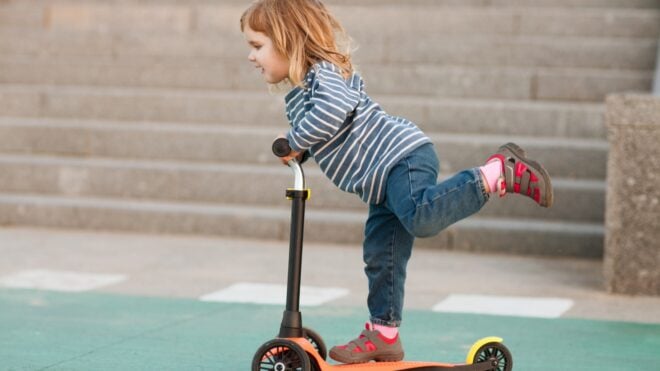There are few things cuter than a big furry dog protecting a beloved little baby, but these relationships can have rocky beginnings. When your four-legged baby meets your two-legged baby, jealousy and aggression are risks. An infant can't be trained to behave a particular way toward the dog, so a combination of retraining your pet and retraining yourself is the key to putting both of your babies on the road to harmony.
RELATED: Introducing Your New Pet and Baby
Prepare The Dog First
If baby hasn't yet arrived, take this time to acclimate your dog to the sights and sounds of a baby. The American Humane Association recommends playing recordings of a baby's cries and babbles throughout the house and carrying around a realistic baby doll so your dog can see you holding and rocking it. Let your dog see and sniff your baby's car seat and rub a little baby powder or baby shampoo on the doll so your dog can get used to these smells. When the baby arrives, greet your dog on your own first, then have someone else leash and control the dog while you make the introduction.
Guard Baby
Never leave your baby unsupervised when the dog is around, and don't give the dog too much access to the baby. Give your infant tummy time while the dog is being walked or is closed in another room. As he grows and begins to develop language skills, emphasize to your baby how to handle the dog the right way by saying things such as "We pet the doggy softly, we don't pull his tail." When baby's nearby, watch the dog carefully for signs of aggression — becoming very still and rigid, guttural barking and showing teeth are warning signs that your pet is on edge, according to the ASPCA. Separate the two immediately if you spot these signs.
Keep Fido Happy
While buying diapers in bulk, pick up dog treats too. Teaching your pet to associate rewards with proper behavior around the baby should help the dog learn what you expect. Hand over treats whenever the dog is sweet and calm near the baby, but withhold treats and send the dog away if he's too aggressive or demanding. Give the dog as much attention as you can. Hiring a dog walker to provide extra walks and affection may also help keep your dog calm at home rather than jealous.
RELATED: Aggression in Dogs
Consult The Experts
Schedule regular vet visits for your dog to ensure all vaccinations stay up-to-date. If you haven't yet done so, have your dog neutered or spayed; this procedure makes dogs less aggressive and less likely to bite, according to the Humane Society. Scheduling a few sessions with a dog trainer can help you and the dog learn a few useful skills. For instance, you can teach your dog to tap your hand during moments of anxiety or to go away on your command, according to the ASPCA. A trainer can also help you determine whether or not an aggressive dog needs to find another loving home for your baby's safety.
Photo via Jupiterimages/Stockbyte/Getty Images



